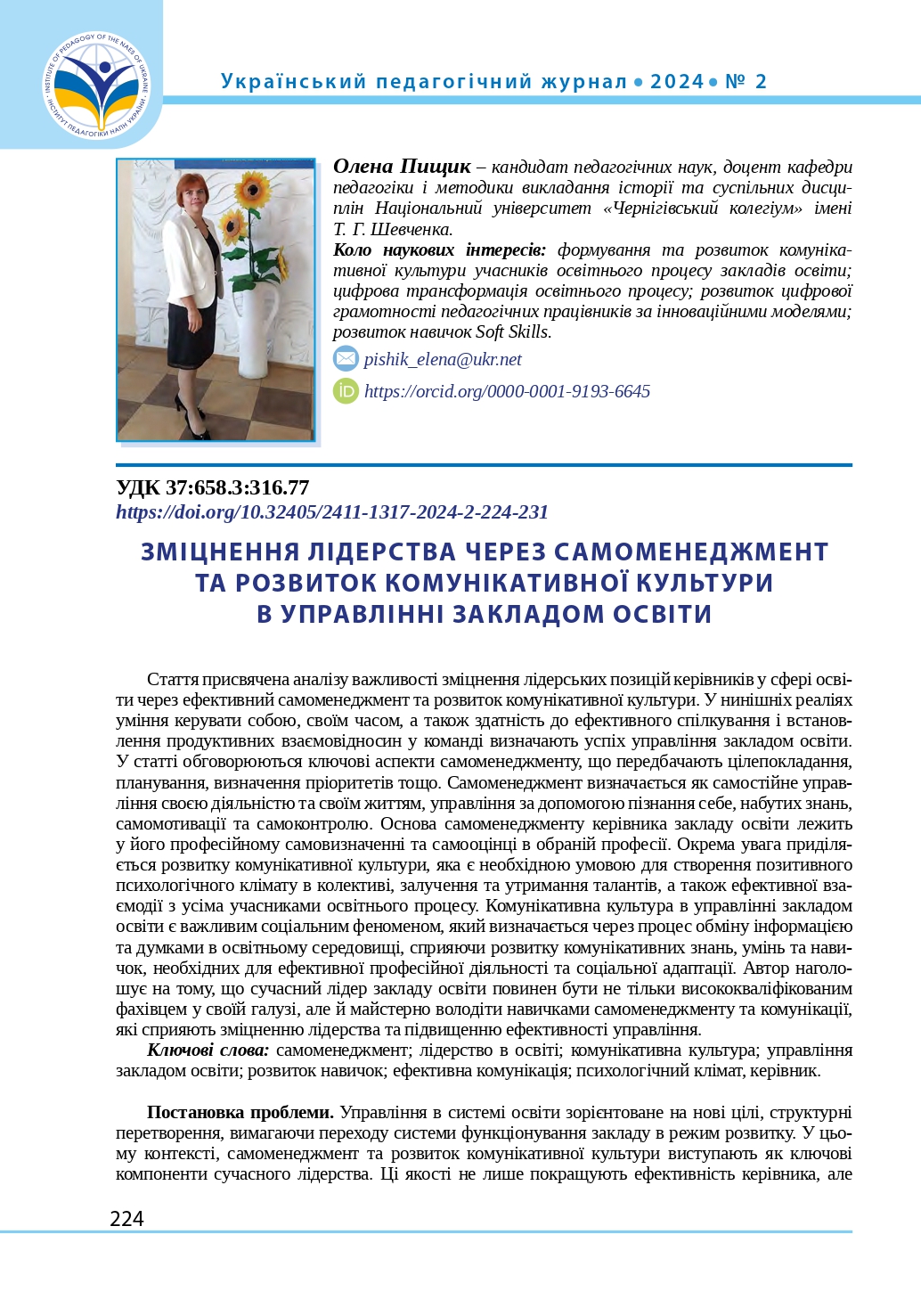Abstract
This article explores the importance of strengthening leadership positions of education managers through effective self-management and the development of a communicative culture. In today’s dynamic realities, the ability to manage oneself, one’s time, as well as the ability to communicate effectively and establish productive relationships within a team, are crucial for the successful management of an educational institution. The article discusses key aspects of self-management, including goal setting, planning, prioritizing, etc. Self-management is defined as independent management of one’s activities and life, utilizing self-awareness, acquired knowledge, self-motivation, and self-control. The foundation of a manager's self-management in an educational institution lies in their professional self-determination and self-assessment in the chosen profession. Particular attention is paid to the development of communicative culture, which is essential for creating a positive psychological atmosphere in the team, attracting and retaining talent, and effective interaction with all participants of the educational process. The communicative culture in the management of an educational institution is an important social phenomenon, defined through the process of exchanging information and ideas in the educational environment, facilitating the development of communicative knowledge, skills, and competencies necessary for effective professional activity and social adaptation. The author emphasizes that a modern leader of an educational institution must not only be a highly qualified specialist in their field but also master the skills of self-management and communication, which contribute to strengthening leadership and increasing management efficiency.
References
Зайверт, Л. (1990). Ваш час – у ваших руках: поради керівникам, як ефективно використовувати робочий час [Переклад з німецької та передмова В. Шепеля]. Полтава.
Пищик, О.В. (2019). Розвиток комунікативної культури керівників професійно-технічних навчальних закладів у системі післядипломної педагогічної освіти. [Автореферат дисертації кандидата педагогічних наук]. Чернігів: Національний університетт «Чернігівський колегіум» імені Т. Г. Шевченка.
Сарновська, С. О. (2000). Сучасна соціальна комунікативна культура (філософсько-методологічний аналіз). [Дисертація кандидата філософських наук]. Київ: Київський ін-т туризму, економіки і права.
Сухомлинский, В.А. (1988). Сто порад учителю. Київ: Радянська школа.
Тимошко, Г.М. (2019). Теоретичні підходи до перфоманс-самоменеджменту керівника Нової української школи. Теорія та методика управління освітою, 1 (22). http://umo.edu.ua/images/content/nashi_vydanya/metod_upr_osvit/v_22/%D0%A2% %D0%BE.pdf
Drucker, P. (2007). Management Challenges for the 21st Century (1st ed.). Routledge. https://doi.org/10.4324/9780080942384
Stogdill, R. (1974). Handbook of leadership: A survey of theory and research. New York: The Free Press.
Drucker, P. (2007). Management Challenges for the 21st Century (1st ed.). Routledge. https://doi.org/10.4324/9780080942384 (in English).
Pyshchyk, O.V. (2019). Rozvytok komunikatyvnoi kultury kerivnykiv profesiino-tekhnichnykh navchalnykh zakladiv u systemi pisliadyplomnoi pedahohichnoi osvity. [Аvtoreferat dysertatsii kandydata pedahohichnykh nauk]. Chernihiv: Natsionalnyi universytett «Chernihivskyi kolehium» imeni T. H. Shevchenka. (in Ukrainian).
Sarnovska, S. O. (2000). Suchasna sotsialna komunikatyvna kultura (filosofsko-metodolohichnyi analiz). [Dysertatsiia kandydata filosofskykh nauk. Kyiv: Kyivskyi in-t turyzmu, ekonomiky i prava]. (in Ukrainian).
Stogdill, R. (1974). Handbook of leadership: A survey of theory and research. New York: The Free Press. (in English).
Sukhomlynskyi, V.A. (1988). Sto porad uchyteliu. Kyiv: Radianska shkola. (in Ukrainian).
Tymoshko, H.M. (2019). Teoretychni pidkhody do perfomans-samomenedzhmentu kerivnyka Novoi ukrainskoi shkoly. Teoriia ta metodyka upravlinnia osvitoiu, 1 (22). http://umo.edu.ua/images/content/nashi_vydanya/metod_upr_osvit/v_22/%D0%A2% %D0%BE.pdf (in Ukrainian).
Zaivert, L. (1990). Vash chas – u vashykh rukakh: porady kerivnykam, yak efektyvno vykorystovuvaty robochyi chas. [Pereklad z nimetskoi ta peredmova V. Shepelia]. Poltava. (in Ukrainian).

This work is licensed under a Creative Commons Attribution-NonCommercial-ShareAlike 4.0 International License.


